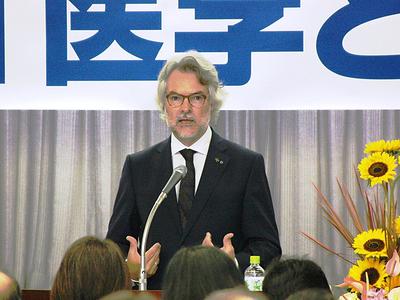

 
|
Joint
Symposium of the European Academy of Science and Arts and the Institute
of Oriental Philosophy: “Medicine and Religion”
The
European Academy of Science and Arts (EASA) at Vienna, Austria was
founded in 1990 of the Post-Cold War era with the aim to examine
various problems facing Europe with the help of a close-meshed network
of scientists and artists. Since its establishment, the EASA has
conducted numerous international and interdisciplinary projects, and
expanded its network to over 50 countries in Europe, North and South
America, the Middle East and Asia. Moreover, 28 members of the academy
are
Nobel laureates (Oct. 2011).
As a part of its activities, the EASA has been promoting interreligious
dialogue with four major world religions: Christianity, Buddhism,
Islam and Judaism. On behalf of Buddhism, the Soka Gakkai
International (SGI) and the Institute of Oriental Philosophy (IOP)
cosponsored 9 symposiums with the academy. Dr. Felix Unger, President
of EASA, has exchanged opinions with IOP founder Daisaku Ikeda,
and their dialogue series, The Humanist Principle―Compassion and
Tolerance was published by the IOP.
Moreover, Mr. Ikeda was presented with the “Special Gold Medallion
Commendation,” “Golden Medal of Merit” and “Light of Peace Award” from
and became the first Japanese Honorary Senator of the EASA.
This joint symposium "Medicine and Religion" was held in commemoration
of the 50th anniversary of the IOP and 6 delegates spoke on "Healing"
and the "Ethics of Medicine" from the perspective of Buddhism and
Christianity.
 One
of the delegates, Dr. Yoichi Kawada, Director of IOP spoke on
“Depictions of Shakyamuni Buddha as Healer” and Dr. Felix Unger
presented his lecture titled “Ethics in Medicine―Reflections by a
Cardiac Surgeon.” Dr. Unger said that “health” has been one of the
oldest endeavors in the history of man and that the history and ethics
of
medicine have changed over time to achieve good health. He stressed
that medicine is a part of all our cultural endeavors. Thus, doctors
with technic need to be educated with ethical value. He said that in
the dialogue with IOP founder Daisaku Ikeda, he agreed on the point
that life itself has the highest value. In his lecture, he touched
on The Oath of Hippocrates, one of the most widely known Greek
medical texts that serves as an ethical guide for the medical
profession, and emphasized the importance of medical care that serves
patients. One
of the delegates, Dr. Yoichi Kawada, Director of IOP spoke on
“Depictions of Shakyamuni Buddha as Healer” and Dr. Felix Unger
presented his lecture titled “Ethics in Medicine―Reflections by a
Cardiac Surgeon.” Dr. Unger said that “health” has been one of the
oldest endeavors in the history of man and that the history and ethics
of
medicine have changed over time to achieve good health. He stressed
that medicine is a part of all our cultural endeavors. Thus, doctors
with technic need to be educated with ethical value. He said that in
the dialogue with IOP founder Daisaku Ikeda, he agreed on the point
that life itself has the highest value. In his lecture, he touched
on The Oath of Hippocrates, one of the most widely known Greek
medical texts that serves as an ethical guide for the medical
profession, and emphasized the importance of medical care that serves
patients.
The following lectures were also delivered at the symposium:
1) Reiko Inamitsu (IOP Commissioned Research Fellow)
“Buddhism and Healing--from the Science of Nursing View Point”
2) Dr. Elmer Kuhn (Secretary General of the NGO “Christian Solidarity
International - Austria”)
“Holistic Healing from a Theological Point of View--Paradigm Shift in
Our Societies: Rediscovery of Dignity, Values and Internal Wholeness
as a Path toward the Convalescence of Humankind”
3) Akihiko Nakaizumi (Professor, Kyoto University/IOP Commissioned
Research Fellow)
“Problems of the Modern Medical Treatment--Reflections by a
Doctor, Scientist, and Buddhist”
4) Shinichi Kogure (Professor, Soka University/IOP Commissioned
Research Fellow)
“The Bioethical Issues and The View Point of Buddhism”
Felix Unger
Biographical Sketch:
Felix Unger was born in 1946. He is a doctor of medicine and a cardiac
surgeon. He studied
medicine at the University of Vienna, and worked as a hospital director
of a cardiac surgical
department at University of Salzburg from 1985 to 2011. The European
Academy of Science and Arts
was established in 1990 and he became president as one of its
founders and a director of the
research institute of cardiology.
Main Publications:
・Health is Wealth: Strategic Visions for European Healthcare at the
Beginning of the 21st Century,
Report of the European Parliament (2004)
・Cardiac Reconstruction (1990)
・Paradigma Der Medizin Im 21. Jahrhundert (2006)
Elmar Kuhn
Biographical Sketch:
Elmar Kuhn was born in 1961. He received his Ph.D. in
theology from the University of Vienna in 1992. He is a speaker of the
consistory of the class “world religion” of the European Academy of
Science and Arts and a member of the board of trustees of the Pius
Parsch society for liturgics, Klosterneuburg. He teaches at Vienna
University of Education and works as secretary general of the NGO
“Christian Solidarity International-Austria” for the right of religious
freedom. He is also a scientific assistant to the director of the
archbishops education authority Vienna.
|











